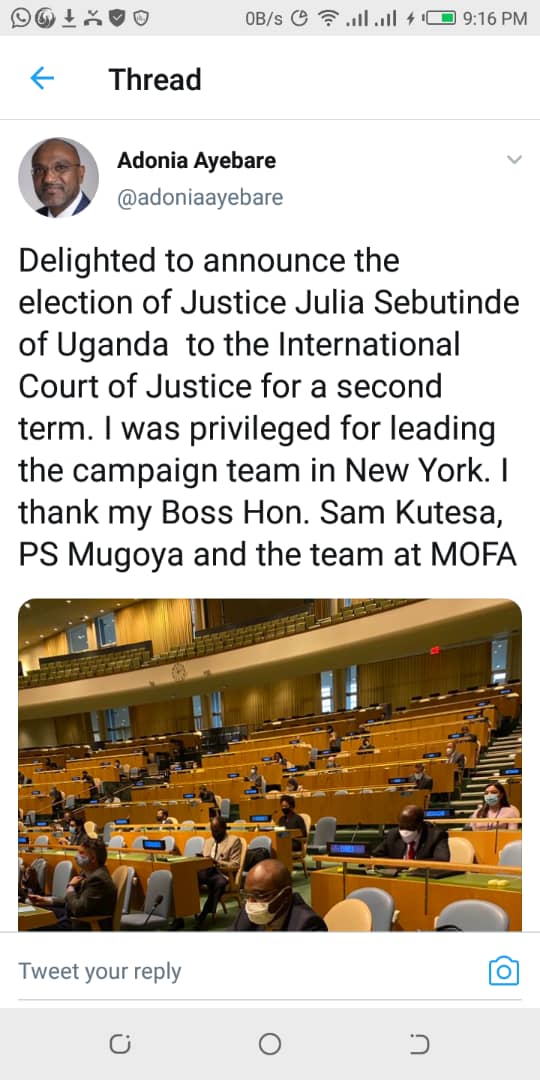Sebutinde voted for second term at the International Court of Justice
In order to be elected, a candidate had to have an absolute majority in both bodies, which often leads to much lobbying and a number of rounds of voting.
NEWS | UN
Justice Julia Sebutinde has been granted a second term at the United Nations International Court of Justice (ICJ).
Sebutinde is one of Africa's most senior female judges and the first woman to work as a judge at the ICJ which she joined on February 6, 2012.
According to ICJ website, for one to be appointed a judge at the ICJ, he or she had to be elected by members of the United Nations General Assembly and the Security Council, where polling takes place simultaneously but independent of each other.
In order to be elected, a candidate had to have an absolute majority in both bodies, which often leads to much lobbying and a number of rounds of voting.
Sebutinde won garnering the fifth highest votes after Japan, Germany, China and Slovakia. The other two African contenders came in sixths and seventh respectively. This is how the votes came in: Japan 169; Germany 160; China 155; Slovakia 150; Uganda 139; Rwanda 87; Nigeria 42; Croatia 31.
Adonia Ayebare, Uganda's Ambassador and Permanent Representative of Uganda to the United Nations congratulated Ssebutinda and the country on the win. 
Who is Sebutinde?
The 66-year-old was born on February 28, 1954, and attended Lake Victoria Primary School in Entebbe.
She later joined Gayaza High School and later King's College Budo, before being admitted at Makerere University where she obtained a degree in law in 1977 and later a Diploma in Legal Practice from Law Development Center in 1978.
She holds a Doctorate of Laws, honoris causa, the University of Edinburgh in the UK, for distinguished service in the field of international justice and human rights (2009). Master of Laws Degree with Distinction (LLM), University of Edinburgh, U.K. (1990).
Julia Sebutinde first worked in the Ministry of Justice in the Government of Uganda from 1978 until 1990. After graduating from the University of Edinburgh, the UK in 1991, she worked in the Ministry of the Commonwealth in the UK.
She later joined the Ministry of Justice in Namibia, which had just attained Independence at that time.
In 1996, she was appointed Judge of the High Court of Uganda. In that capacity, she presided over three commissions of inquiry related to following government departments which included Chairperson, Judicial Commission of Inquiry into Corruption in the Uganda Police Force (1999-2000) which revealed massive rot in the force; Chairperson, Judicial Commission of Inquiry into Mismanagement in the Uganda People's Defence Forces (2001); Chairperson, Judicial Commission of Inquiry into Corruption in the Uganda Revenue Authority (URA).
In 2005 Justice Sebutinde was appointed, with secondment from the Uganda government, to Special Court on Sierra Leone, established by the UN. She was later appointed Presiding Judge of Trial Chamber II of the SCSL (2007-2008, 2010-2011) which handled several high profile war crime trials including the Prosecutor v. Charles Ghankay Taylor; Judge of the High Court of Uganda with original and appellate jurisdiction in civil and criminal cases (1996-2011);
She has also held several other positions which include Chancellor of the International Health Sciences University (IHSU), Uganda (2008-2011); Member, Commonwealth Association of Legislative Drafters (1980-2011); Goodwill Ambassador for the United Nations Population Fund (UNFPA) (1996-2011); Member, National Association of Women Judges Uganda (NAWJU) (1996-2011); Member, International Association of Women Judges (IAWJ) (1996-2011); Member, Advocates International (AI) (1980-2011); Represented Uganda Women at the opening of the United Nations Decade for Women in Addis Ababa, Ethiopia (1975); Chairperson, Board of Directors of the Acid Survivors Foundation Uganda (2000-2004); Recipient of the "Good Samaritan Award" at the Congress of Advocates International (2004); the Lifetime Achievement Award of the Uganda British Alumni Association (UBAA) (2006) and a Special Award of the Uganda Law Society in recognition of her "courageous and exemplary contribution to the promotion of justice in Uganda" (2001); Honouree of the American Biographical Institute in their seventh edition of "Who's Who of the Professionals 2000"; Named one of "Top 100 Africans of the Year" in the Africa Almanac 2000 among others.